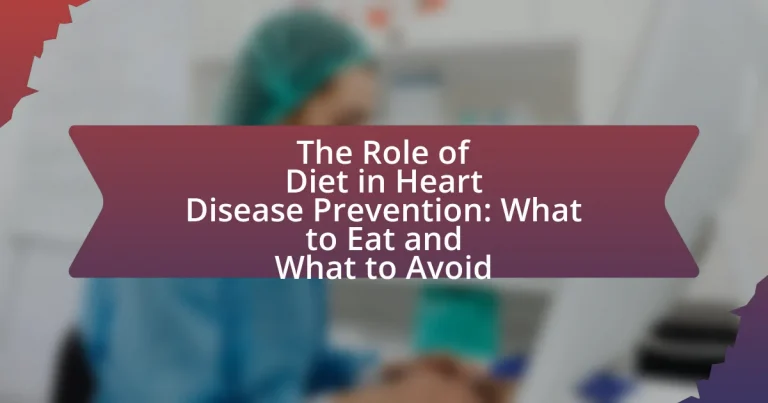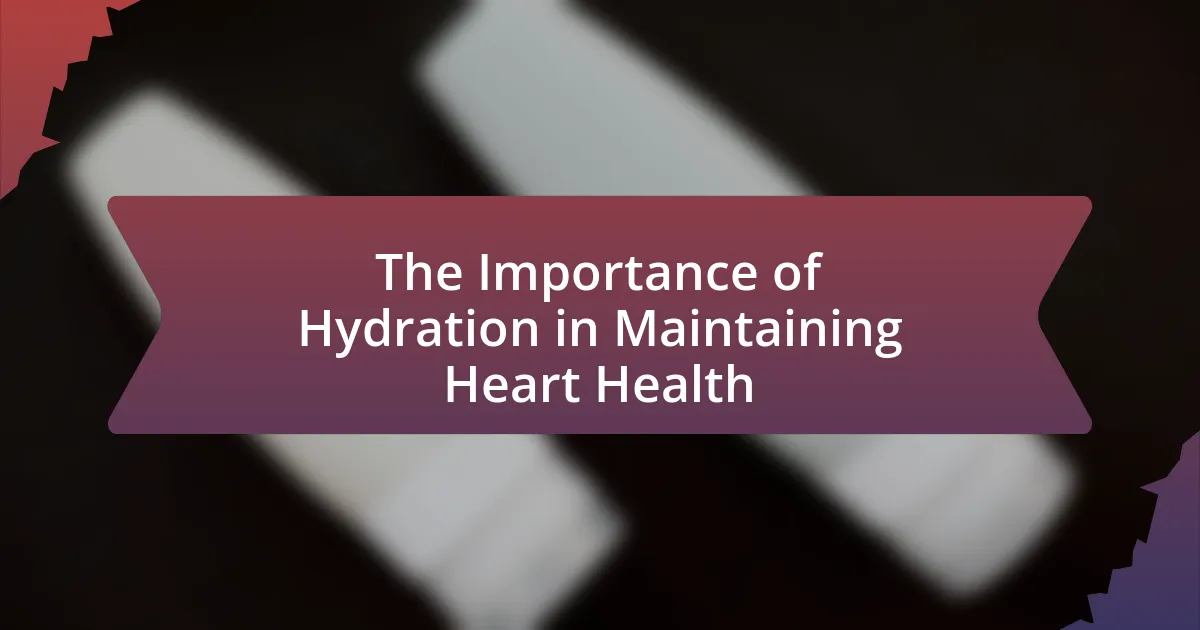The article focuses on the critical role of diet in preventing heart disease, emphasizing how dietary choices influence risk factors such as cholesterol levels, blood pressure, and body weight. It outlines the components of a heart-healthy diet, including fruits, vegetables, whole grains, lean proteins, and healthy fats, while highlighting the benefits of specific dietary patterns like the Mediterranean diet. Additionally, the article discusses key nutrients that support heart health, the impact of dietary patterns on cardiovascular risk, and provides practical recommendations on foods to include and avoid for optimal heart health.
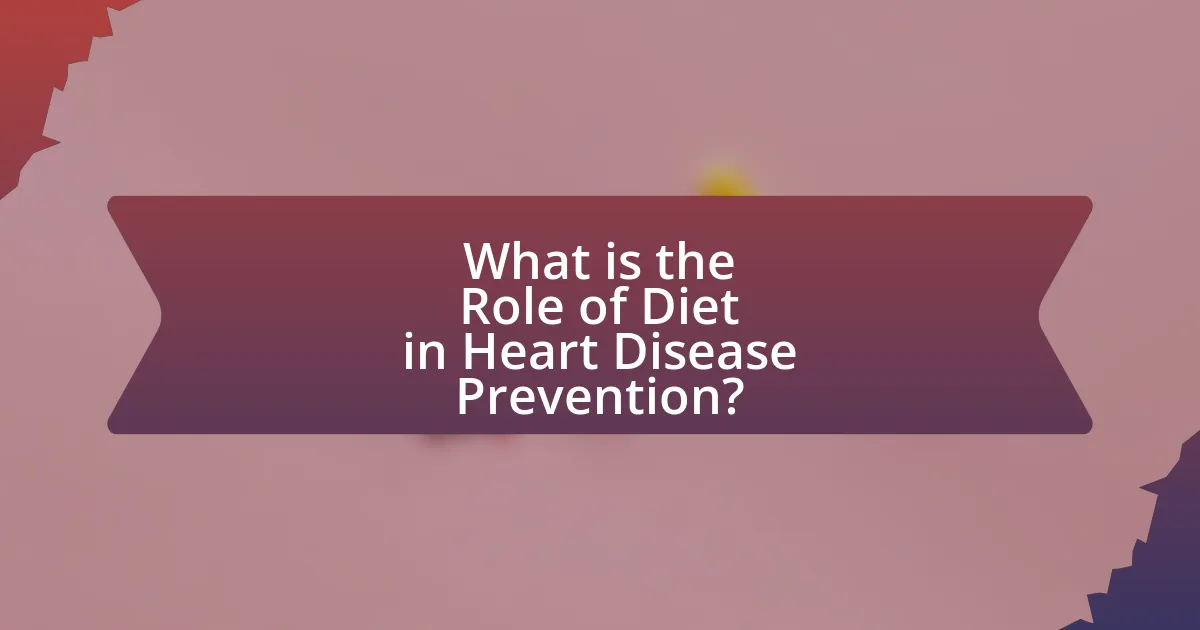
What is the Role of Diet in Heart Disease Prevention?
Diet plays a crucial role in heart disease prevention by influencing risk factors such as cholesterol levels, blood pressure, and body weight. A heart-healthy diet typically includes fruits, vegetables, whole grains, lean proteins, and healthy fats, which can lower the risk of cardiovascular diseases. For instance, the Mediterranean diet, rich in olive oil, nuts, and fish, has been associated with a 30% reduction in heart disease risk according to a study published in the New England Journal of Medicine. Additionally, diets low in saturated fats and high in fiber can help reduce LDL cholesterol, a significant contributor to heart disease.
How does diet influence heart health?
Diet significantly influences heart health by affecting cholesterol levels, blood pressure, and inflammation. A diet rich in fruits, vegetables, whole grains, and healthy fats, such as those found in fish and nuts, can lower the risk of heart disease. For instance, the American Heart Association recommends a diet low in saturated fats, trans fats, and sodium to maintain optimal heart function. Studies show that individuals adhering to a Mediterranean diet, which emphasizes these food groups, have a 30-40% lower risk of cardiovascular events compared to those with a typical Western diet. Thus, dietary choices play a crucial role in promoting cardiovascular health and preventing heart disease.
What are the key nutrients that support heart health?
Key nutrients that support heart health include omega-3 fatty acids, fiber, antioxidants, potassium, and magnesium. Omega-3 fatty acids, found in fatty fish like salmon, have been shown to reduce inflammation and lower the risk of heart disease. Fiber, present in whole grains, fruits, and vegetables, helps lower cholesterol levels and maintain healthy blood pressure. Antioxidants, such as those found in berries and dark chocolate, protect the heart by reducing oxidative stress. Potassium, abundant in bananas and leafy greens, helps regulate blood pressure, while magnesium, found in nuts and seeds, supports overall cardiovascular function. These nutrients collectively contribute to heart health by improving lipid profiles, reducing blood pressure, and decreasing inflammation.
How do dietary patterns affect cardiovascular risk?
Dietary patterns significantly influence cardiovascular risk by determining the intake of nutrients that affect heart health. Diets high in saturated fats, trans fats, and added sugars are associated with increased levels of LDL cholesterol and inflammation, both of which elevate cardiovascular risk. Conversely, dietary patterns rich in fruits, vegetables, whole grains, and healthy fats, such as those found in the Mediterranean diet, have been shown to lower blood pressure, improve lipid profiles, and reduce the incidence of heart disease. For instance, a study published in the Journal of the American College of Cardiology found that adherence to a Mediterranean diet was linked to a 30% reduction in cardiovascular events. Thus, the composition of dietary patterns plays a crucial role in modulating cardiovascular health outcomes.
Why is diet important for preventing heart disease?
Diet is crucial for preventing heart disease because it directly influences risk factors such as cholesterol levels, blood pressure, and body weight. A balanced diet rich in fruits, vegetables, whole grains, and healthy fats can lower LDL cholesterol and reduce inflammation, both of which are linked to heart disease. For instance, the American Heart Association recommends diets like the Mediterranean diet, which has been shown to decrease the incidence of cardiovascular events by up to 30% in various studies. Additionally, diets high in saturated fats and sugars can lead to obesity and hypertension, increasing heart disease risk. Therefore, dietary choices play a significant role in maintaining heart health and preventing disease.
What is the relationship between diet and cholesterol levels?
Diet significantly influences cholesterol levels, with specific foods impacting the amount of LDL (low-density lipoprotein) and HDL (high-density lipoprotein) cholesterol in the body. For instance, diets high in saturated fats, commonly found in red meat and full-fat dairy products, can raise LDL cholesterol levels, increasing the risk of heart disease. Conversely, consuming foods rich in unsaturated fats, such as olive oil, avocados, and nuts, can help lower LDL cholesterol and raise HDL cholesterol. Research published in the Journal of the American College of Cardiology indicates that a Mediterranean diet, which emphasizes fruits, vegetables, whole grains, and healthy fats, is associated with lower cholesterol levels and reduced cardiovascular risk.
How does diet impact blood pressure?
Diet significantly impacts blood pressure by influencing the body’s sodium levels, weight, and overall cardiovascular health. High sodium intake is linked to increased blood pressure, as it causes the body to retain water, leading to higher blood volume and pressure on blood vessel walls. Conversely, diets rich in fruits, vegetables, whole grains, and low-fat dairy, such as the DASH (Dietary Approaches to Stop Hypertension) diet, have been shown to lower blood pressure. Research published in the American Journal of Hypertension indicates that individuals adhering to the DASH diet can experience reductions in systolic blood pressure by an average of 5 to 6 mm Hg. This evidence underscores the critical role of dietary choices in managing and preventing hypertension.
What are the general dietary recommendations for heart disease prevention?
To prevent heart disease, individuals should adopt a diet rich in fruits, vegetables, whole grains, lean proteins, and healthy fats. This dietary approach is supported by research indicating that a Mediterranean diet, which emphasizes these food groups, is associated with a lower risk of cardiovascular events. For instance, a study published in the New England Journal of Medicine found that participants following a Mediterranean diet had a 30% reduction in the risk of major cardiovascular events compared to those on a low-fat diet. Additionally, limiting saturated fats, trans fats, and sodium is crucial, as high intake of these can lead to increased cholesterol levels and hypertension, both of which are risk factors for heart disease.
What types of foods should be included in a heart-healthy diet?
A heart-healthy diet should include fruits, vegetables, whole grains, lean proteins, and healthy fats. Fruits and vegetables provide essential vitamins, minerals, and antioxidants that support heart health. Whole grains, such as oats and brown rice, are rich in fiber, which can help lower cholesterol levels. Lean proteins, including fish, poultry, and legumes, contribute to muscle health without excessive saturated fat. Healthy fats, particularly those found in nuts, seeds, and olive oil, can improve cholesterol levels and reduce inflammation. Research from the American Heart Association indicates that diets rich in these food types can significantly lower the risk of heart disease.
What foods should be limited or avoided for heart health?
Foods that should be limited or avoided for heart health include saturated fats, trans fats, high-sodium foods, and added sugars. Saturated fats, found in red meat and full-fat dairy products, can raise cholesterol levels, increasing heart disease risk. Trans fats, often present in processed foods and baked goods, are linked to higher levels of bad cholesterol and lower levels of good cholesterol. High-sodium foods, such as processed snacks and canned soups, can lead to hypertension, a significant risk factor for heart disease. Added sugars, commonly found in sugary beverages and desserts, contribute to obesity and metabolic syndrome, both of which are detrimental to heart health.
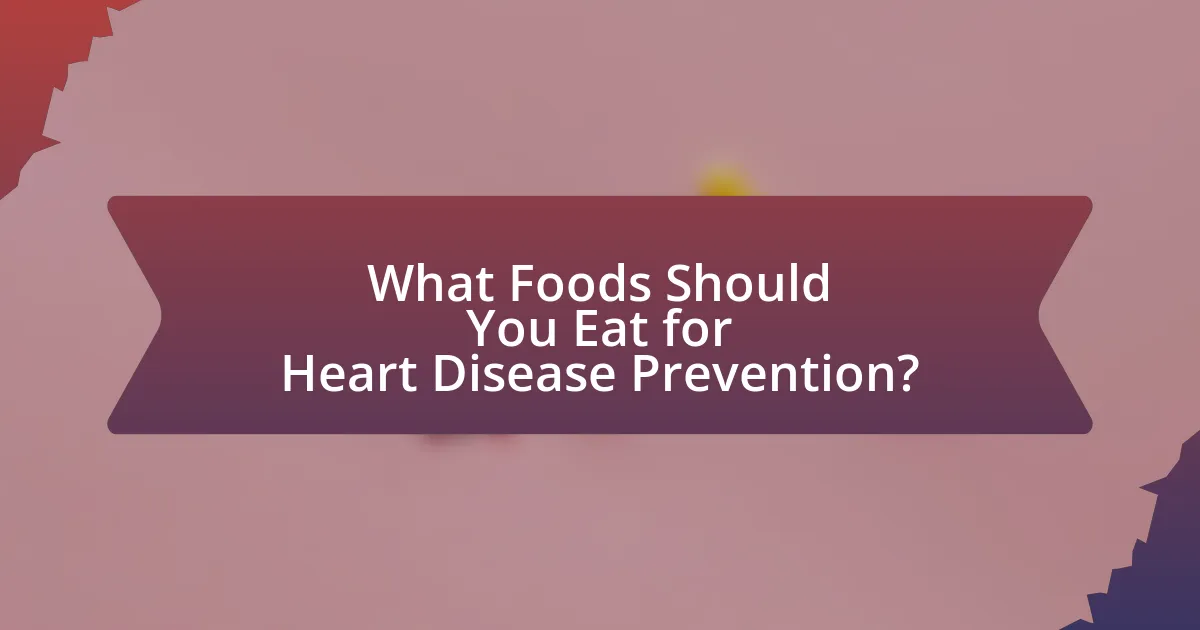
What Foods Should You Eat for Heart Disease Prevention?
To prevent heart disease, individuals should consume foods rich in omega-3 fatty acids, fiber, antioxidants, and healthy fats. These include fatty fish like salmon and mackerel, whole grains such as oats and brown rice, fruits like berries and apples, vegetables including leafy greens and broccoli, nuts such as walnuts and almonds, and legumes like beans and lentils. Research indicates that diets high in these foods can lower cholesterol levels, reduce inflammation, and improve overall heart health. For instance, a study published in the Journal of the American College of Cardiology found that a Mediterranean diet, which emphasizes these food groups, is associated with a significantly lower risk of cardiovascular events.
What are the best sources of healthy fats?
The best sources of healthy fats include avocados, nuts, seeds, olive oil, and fatty fish. Avocados provide monounsaturated fats that can lower bad cholesterol levels, while nuts and seeds are rich in omega-3 and omega-6 fatty acids, which are essential for heart health. Olive oil, particularly extra virgin, is known for its anti-inflammatory properties and is a staple in the Mediterranean diet, which has been linked to reduced heart disease risk. Fatty fish, such as salmon and mackerel, are high in omega-3 fatty acids, which have been shown to decrease the risk of heart disease by improving cholesterol levels and reducing inflammation.
How do omega-3 fatty acids benefit heart health?
Omega-3 fatty acids benefit heart health by reducing inflammation, lowering triglyceride levels, and improving overall cardiovascular function. Research indicates that omega-3s can decrease the risk of heart disease by lowering blood pressure and preventing the formation of arterial plaques. A study published in the Journal of the American College of Cardiology found that individuals who consumed omega-3 fatty acids regularly had a 30% lower risk of heart disease compared to those who did not. Additionally, the American Heart Association recommends consuming fatty fish, rich in omega-3s, at least twice a week to promote heart health.
What role do monounsaturated fats play in cardiovascular health?
Monounsaturated fats play a beneficial role in cardiovascular health by improving lipid profiles and reducing the risk of heart disease. These fats help lower levels of LDL cholesterol, which is associated with a higher risk of cardiovascular issues, while simultaneously increasing HDL cholesterol, known for its protective effects on heart health. Research published in the American Journal of Clinical Nutrition indicates that diets rich in monounsaturated fats, such as those found in olive oil and avocados, can lead to significant reductions in cardiovascular events. Additionally, a meta-analysis in the journal Circulation found that replacing saturated fats with monounsaturated fats can decrease the risk of coronary heart disease by up to 30%.
Which fruits and vegetables are most beneficial for heart health?
Berries, leafy greens, and citrus fruits are among the most beneficial fruits and vegetables for heart health. Berries, such as blueberries and strawberries, are rich in antioxidants and have been shown to lower blood pressure and reduce inflammation, which are key factors in heart disease. Leafy greens like spinach and kale are high in vitamins, minerals, and fiber, contributing to improved heart health by lowering cholesterol levels. Citrus fruits, including oranges and grapefruits, contain high levels of vitamin C and flavonoids, which have been linked to a reduced risk of heart disease. Studies indicate that diets rich in these fruits and vegetables can significantly lower the risk of cardiovascular issues, supporting their role in heart disease prevention.
What antioxidants are found in fruits and vegetables that protect the heart?
Fruits and vegetables contain several antioxidants that protect the heart, including flavonoids, vitamin C, and vitamin E. Flavonoids, found in berries, apples, and citrus fruits, have been shown to improve endothelial function and reduce blood pressure, which are crucial for heart health. Vitamin C, abundant in oranges, strawberries, and bell peppers, helps prevent oxidative stress and inflammation, both of which are linked to heart disease. Vitamin E, present in spinach, avocados, and nuts, acts as a powerful antioxidant that protects cell membranes from damage. Studies indicate that diets rich in these antioxidants are associated with a lower risk of cardiovascular diseases, highlighting their protective role in heart health.
How does fiber from plant foods contribute to heart disease prevention?
Fiber from plant foods contributes to heart disease prevention by lowering cholesterol levels and improving blood vessel function. Soluble fiber, found in foods like oats, beans, and fruits, binds to cholesterol in the digestive system, facilitating its excretion and thereby reducing overall cholesterol levels. Studies indicate that a diet high in fiber can lower the risk of cardiovascular disease; for instance, research published in the Journal of the American College of Cardiology found that each additional 7 grams of fiber consumed daily is associated with a 9% reduction in the risk of heart disease. Additionally, fiber-rich diets promote healthy blood pressure and weight management, both of which are critical factors in heart disease prevention.
What whole grains should be included in a heart-healthy diet?
Whole grains that should be included in a heart-healthy diet are oats, brown rice, quinoa, barley, and whole wheat. These grains are rich in dietary fiber, which has been shown to lower cholesterol levels and reduce the risk of heart disease. For instance, a study published in the American Journal of Clinical Nutrition found that consuming whole grains can significantly decrease the risk of cardiovascular disease due to their beneficial effects on blood pressure and cholesterol levels.
How do whole grains affect cholesterol and blood sugar levels?
Whole grains lower cholesterol and stabilize blood sugar levels. The soluble fiber in whole grains, such as oats and barley, binds to cholesterol in the digestive system, reducing its absorption and leading to lower blood cholesterol levels. Studies indicate that consuming whole grains can decrease total cholesterol by 5-10% and LDL cholesterol by 10-15%. Additionally, whole grains have a low glycemic index, which helps regulate blood sugar levels by promoting gradual glucose release into the bloodstream. Research published in the American Journal of Clinical Nutrition found that individuals who consume whole grains regularly have a 20-30% lower risk of developing type 2 diabetes compared to those who consume refined grains.
What are some examples of heart-healthy whole grains?
Examples of heart-healthy whole grains include oats, quinoa, brown rice, barley, and whole wheat. These grains are rich in fiber, which can help lower cholesterol levels and reduce the risk of heart disease. Studies have shown that diets high in whole grains are associated with a lower risk of cardiovascular disease, as they provide essential nutrients and promote better heart health.
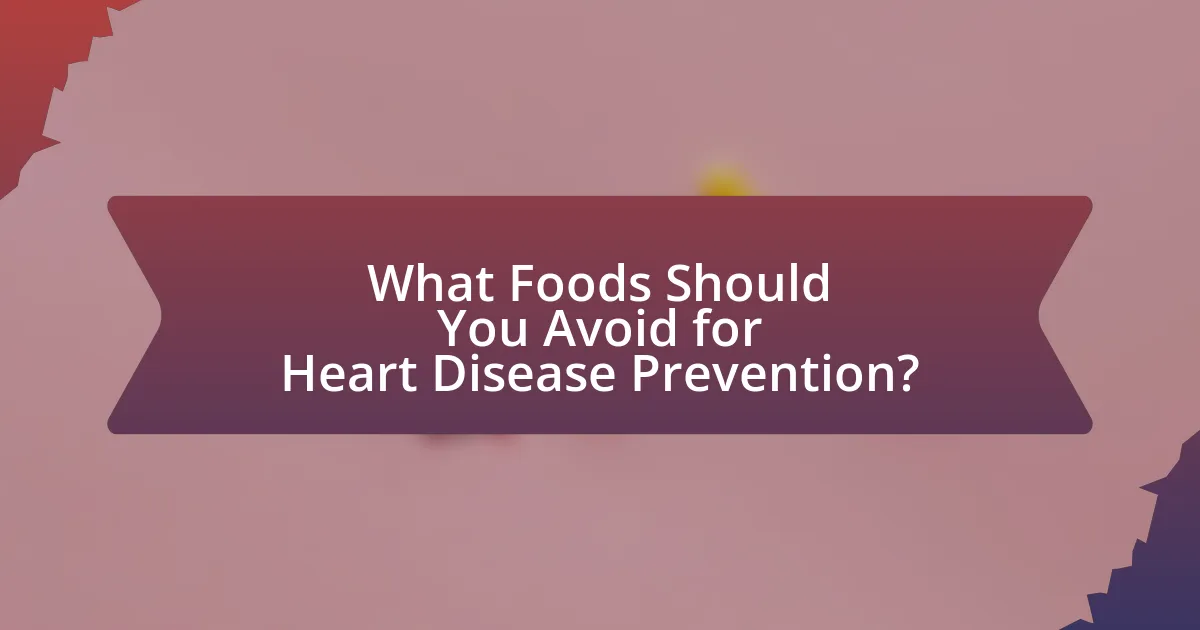
What Foods Should You Avoid for Heart Disease Prevention?
To prevent heart disease, you should avoid foods high in saturated fats, trans fats, and added sugars. Saturated fats, found in red meat and full-fat dairy products, can raise cholesterol levels, increasing heart disease risk. Trans fats, often present in processed foods and baked goods, are linked to higher levels of LDL cholesterol and lower levels of HDL cholesterol, contributing to heart disease. Additionally, foods high in added sugars, such as sugary beverages and sweets, can lead to obesity and increased triglycerides, both of which are risk factors for heart disease.
What types of fats are harmful to heart health?
Trans fats and saturated fats are harmful to heart health. Trans fats, often found in partially hydrogenated oils, increase LDL cholesterol levels while lowering HDL cholesterol, leading to a higher risk of heart disease. Saturated fats, commonly present in red meat, full-fat dairy products, and certain oils, can also raise LDL cholesterol levels. Research published in the American Journal of Clinical Nutrition indicates that high intake of trans fats is associated with an increased risk of coronary heart disease, while the American Heart Association recommends limiting saturated fat intake to less than 6% of total daily calories for optimal heart health.
How do trans fats affect cardiovascular health?
Trans fats significantly increase the risk of cardiovascular disease by raising low-density lipoprotein (LDL) cholesterol levels while lowering high-density lipoprotein (HDL) cholesterol levels. This imbalance contributes to the development of atherosclerosis, a condition characterized by the buildup of fatty deposits in the arteries, which can lead to heart attacks and strokes. Research published in the American Journal of Clinical Nutrition indicates that replacing trans fats with healthier fats can reduce the risk of heart disease by up to 20%.
What are saturated fats, and how should they be managed?
Saturated fats are a type of fat found primarily in animal products and some plant oils, characterized by having no double bonds between carbon atoms in their fatty acid chains. To manage saturated fat intake, health organizations recommend limiting consumption to less than 10% of total daily calories, as excessive intake is associated with increased levels of LDL cholesterol and a higher risk of heart disease. For instance, the American Heart Association advises replacing saturated fats with unsaturated fats, such as those found in olive oil, nuts, and fish, to promote cardiovascular health.
Which processed foods should be limited for heart disease prevention?
Processed foods high in trans fats, saturated fats, added sugars, and sodium should be limited for heart disease prevention. Trans fats, commonly found in margarine, baked goods, and fried foods, raise LDL cholesterol levels and lower HDL cholesterol, increasing heart disease risk. Saturated fats, present in fatty cuts of meat, full-fat dairy products, and certain processed snacks, can also elevate cholesterol levels. Added sugars, prevalent in sugary beverages, candies, and many packaged snacks, contribute to obesity and metabolic syndrome, both risk factors for heart disease. Lastly, high sodium levels in processed foods, such as canned soups and deli meats, can lead to hypertension, a significant risk factor for cardiovascular issues. Reducing the intake of these processed foods can significantly lower the risk of developing heart disease.
How do added sugars impact heart health?
Added sugars negatively impact heart health by increasing the risk of obesity, inflammation, and high blood pressure. Research indicates that high consumption of added sugars, particularly from sugary beverages, is linked to elevated triglyceride levels and lower levels of HDL cholesterol, both of which are risk factors for cardiovascular disease. A study published in the Journal of the American College of Cardiology found that individuals consuming more than 25% of their daily calories from added sugars had a significantly higher risk of heart disease compared to those who consumed less than 10%. This evidence underscores the detrimental effects of added sugars on cardiovascular health.
What preservatives and additives should be avoided?
Preservatives and additives that should be avoided include trans fats, sodium nitrite, and artificial sweeteners. Trans fats, commonly found in partially hydrogenated oils, are linked to increased heart disease risk by raising LDL cholesterol levels. Sodium nitrite, often used in processed meats, can form harmful compounds called nitrosamines, which are associated with cancer. Artificial sweeteners, such as aspartame and sucralose, may disrupt metabolic processes and have been linked to increased appetite and weight gain, further contributing to heart disease risk.
What role does sodium play in heart disease risk?
Sodium plays a significant role in increasing heart disease risk primarily by contributing to hypertension, or high blood pressure. Elevated blood pressure is a well-established risk factor for cardiovascular diseases, including heart attacks and strokes. Research indicates that a high sodium intake can lead to increased blood volume and vascular resistance, which in turn raises blood pressure levels. For instance, a study published in the “New England Journal of Medicine” found that reducing sodium intake can lower blood pressure in individuals with hypertension, thereby decreasing the risk of heart disease.
How can reducing sodium intake benefit heart health?
Reducing sodium intake can significantly benefit heart health by lowering blood pressure, which is a major risk factor for heart disease. High sodium consumption leads to fluid retention and increased blood volume, resulting in elevated blood pressure. According to the American Heart Association, reducing sodium intake to less than 2,300 milligrams per day can lower blood pressure by an average of 5 to 6 mm Hg in individuals with hypertension. This reduction in blood pressure decreases the risk of heart attacks, strokes, and other cardiovascular diseases, thereby promoting overall heart health.
What are some strategies for lowering sodium in the diet?
To lower sodium in the diet, individuals can adopt several effective strategies. First, they should choose fresh, whole foods over processed options, as processed foods often contain high levels of sodium; for example, canned soups and frozen meals can have over 800 mg of sodium per serving. Second, using herbs and spices instead of salt for flavoring can significantly reduce sodium intake; studies show that using herbs can enhance flavor without adding sodium. Third, reading food labels is crucial; products labeled as “low sodium” contain 140 mg or less per serving, helping consumers make informed choices. Lastly, cooking at home allows for better control over sodium levels, as homemade meals can be tailored to include minimal salt. These strategies collectively contribute to a healthier diet and can aid in heart disease prevention.
What practical tips can help maintain a heart-healthy diet?
To maintain a heart-healthy diet, focus on incorporating more fruits, vegetables, whole grains, and lean proteins while reducing saturated fats, trans fats, and sodium. Research indicates that diets rich in these components can lower the risk of heart disease; for example, the American Heart Association recommends consuming at least five servings of fruits and vegetables daily to improve cardiovascular health. Additionally, choosing whole grains over refined grains can help manage cholesterol levels, as whole grains contain more fiber, which is beneficial for heart health.
How can meal planning support heart disease prevention?
Meal planning can support heart disease prevention by promoting the consumption of heart-healthy foods while reducing the intake of harmful ingredients. By organizing meals in advance, individuals can ensure they include fruits, vegetables, whole grains, lean proteins, and healthy fats, which are essential for cardiovascular health. Research indicates that diets rich in these components can lower blood pressure, reduce cholesterol levels, and decrease the risk of heart disease. For instance, a study published in the Journal of the American College of Cardiology found that adherence to a Mediterranean diet, which emphasizes meal planning around healthy foods, is associated with a 30% lower risk of cardiovascular events. Thus, effective meal planning directly contributes to better dietary choices that are crucial for heart disease prevention.
What are some easy substitutions for unhealthy ingredients?
Easy substitutions for unhealthy ingredients include replacing white sugar with honey or maple syrup, using whole grain flour instead of white flour, and substituting butter with avocado or applesauce. These alternatives provide better nutritional profiles; for example, honey contains antioxidants, and whole grain flour offers more fiber, which is beneficial for heart health. Studies show that diets high in fiber can reduce the risk of heart disease, supporting the effectiveness of these substitutions.
